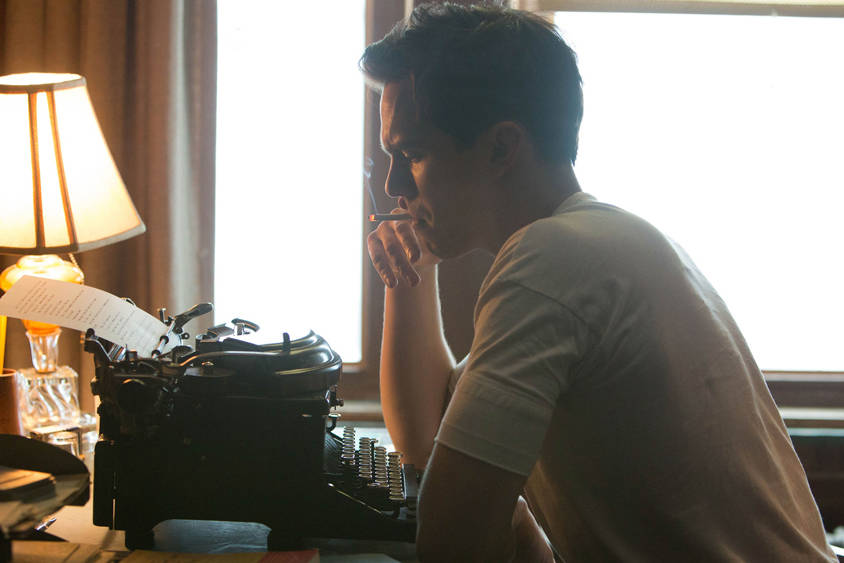Rebel in the Rye is not as terrible as its title, so we can say that for it. Given that its subject had a razor-sharp ear for titles himself—I mean, who can top For Esmé–With Love and Squalor or A Perfect Day for Bananafish?—you might expect a little better from a movie that purports to tell the story of J.D. Salinger. Alas, the title is just the first misstep in a well-meaning but ham-handed attempt to get at Salinger’s mystery, an attempt made fitfully bearable by an intriguing central performance and the tweedy atmosphere of mid-20th-century literary America.
Previous attempts at profiling the reclusive author tended to collapse due to the sheer lack of information about his life or the possibility of legal action from Salinger himself (he died in 2010 at 91). Rebel is written and directed by Danny Strong, who created the TV series Empire, and based on Kenneth Slawenski’s book J. D. Salinger: A Life, published in 2011. Its sincerity is evident in the inspirational-teacher clichés and the firm conclusion that Salinger’s WWII experiences (he was at Utah Beach on D-Day and saw concentration camps first-hand) instilled post-traumatic stress disorder that dictated much of his postwar life and fiction. (There’s no question Salinger suffered shell-shock, as they called it then, but the psychological explanation is a little too familiar as a biopic convention.)
Beyond the cut-and-dried, some of the basic stuff of moviemaking is clumsy enough to derail the project. Scenes in a Manhattan club so baldly try to disguise the low budget they end up looking like a high-school production, full of quick cuts of jazz players and swing dancers as though announcing, “Hey, look how this cinematic energy conveys the high spirits of youth!”
And yet—it’s J.D. Salinger. There is a pull there. We first meet him (played by Nicholas Hoult) as a college washout, living at home with a supportive mother (Hope Davis) and perpetually disappointed father (Victor Garber); the latter can’t understand why Jerry can’t just go into the reliable Salinger business: “Meat and cheese distribution has been very good to this family.” Jerry wants to enroll in the writing classes at Columbia taught by Whit Burnett (Kevin Spacey), the editor of Story magazine. Spacey gets some authentic pathos into the role of a frustrated author who wouldn’t mind getting just a smidgen of credit for having discovered and encouraged one of the era’s major literary talents.
Somewhat mysteriously, Jerry has caught the eye of Oona O’Neill (Zoey Deutsch), the daughter of Eugene O’Neill. It’s too bad things didn’t work out better for the couple, because Deutsch exits too soon; as she lavishly demonstrated in Before I Fall (a teen picture that happens to be one of this year’s most underappreciated films), Deutsch is an ardent, super-focused actress. If anyone out there doesn’t know the identity of Oona O’Neill’s eventual husband, I suppose I shouldn’t spoil it, but let’s just say that from Salinger’s perspective his jilting must have been one of the all-time great “other man” scenarios.
Aside from the inherent interest of wondering what made the author of The Catcher in the Rye tick, there’s also fascination in watching Hoult tackle the role. I would not have guessed that the weird-looking kid from About a Boy would grow into a rangy, lively actor, but Hoult has been impressive in his adult parts, and he committed completely to the manic energy of Mad Max: Fury Road. Here, the Brit actor gets into the staccato rhythms of a New Yorker, his words coming out in quick bursts that mimic the style of a sarcastic wiseguy from a 1930s Hollywood film. His grasp of the role is more insightful than the film’s psychology.
After a certain point, Salinger retreated to his Vermont compound, and declined to publish anything after the mid-1960s—so the movie ends there. Until Salinger’s alleged stockpiled novels start flooding the market, we’ll get this kind of speculative stab at explaining his life. Presumably, he would have hated that.
Rebel in the Rye, Rated PG-13. Opens Fri., Sept. 15 at the Meridian 16 and AMC Seattle 10.
film@seattleweekly.com






